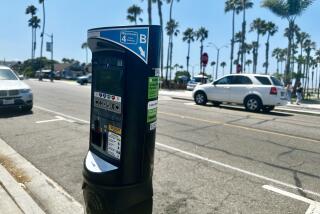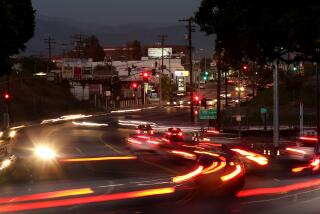Silicon Parking Meters? That’s the Ticket!
- Share via
If you’ve never had trouble finding a parking spot or needed to dash out of a dinner to feed a hungry meter, then you might actually enjoy this column. Otherwise, consider it a warning about the kind of innovation you probably could quite happily live without.
Thanks to digital technologies and the New Federalism, we are now accelerating into the golden age of parking meter technology. Or should we say the silicon age . . .? Never has there been a time of more creative ferment, more compelling ideas or more opportunity to reinvent radically those greedy little quarter-suckers.
Parking-impaired municipalities desperate for better traffic management and higher revenues in an era of increased congestion and government budget cuts are looking for new mechanisms to cope. At the same time, the silicon technologies that transformed electromechanical cash registers and automatic tellers have finally become cheap enough and rugged enough to be packaged as “smart meters” that can do everything but write you a ticket and attach a Denver boot to your car. Oh, what a happy convergence of new technology and market forces!
“There has been a lot of interest by many cities in converting from mechanical parking meters to the electronic ones,” says Stan Stockton, national sales manager at Duncan Industries, the nation’s leader in the $20-million parking meter industry--and, yes, the very same Duncan Industries that produced yo-yos. “The electronics offer so many added features like complete flexibility in setting rates and tracking usage. Reprogramming our meters today is just like changing channels on a television with infrared remote control. You can’t do any of this with the mechanicals.”
No doubt, programmable parking meters were unimaginable 60 years ago in Oklahoma City, where the first parking meter--called the Black Maria--hit the streets in May, 1935. It was the spawn of, umm, a newspaper editor who also chaired the traffic committee of Oklahoma City’s Chamber of Commerce. Within a year, Dallas, Long Beach and Kansas City, Mo., were metering their downtowns with Black Marias.
Today, meters are as much revenue generators as parking regulators. In Los Angeles, 30,000-plus meters generate over $20 million a year. New York’s 65,000-plus meters clear over $55 million annually. The big dollars, however, aren’t in the quarters--they’re found in the fines. An aggressive municipality can easily squeeze $10 in fines for every $1 in metered change, if parking regulations are rigorously enforced. Los Angeles, for example, issues over $200 million worth of meter-related tickets a year.
So with electronics promising to make meters more productive as both information and revenue gatherers, more municipalities are investing in smarter meters. In 1990, Stockton estimates, perhaps 80% of America’s parking meters sold were mechanical and 20% were electronic. By the end of this year, “those numbers may be reversed,” he says.
Of course, this is only the first generation of electronic parking meters. In fact, the level of innovation and ingenuity in parking meter technology is depressingly high. West Hollywood, for example, is testing the parking equivalent of debit cards: Buy your time in advance and have it deducted each time you insert your parking “key” into the meter. Other municipalities, Los Angeles Department of Transportation General Manager Robert R. Yates says, are experimenting with “master meters” for a street that prints out individual slips with allotted times that are then placed against windshields.
“We look at this technological upgrade of the meter industry as very positive,” Yates says. “Switching to electronic mechanisms gives us better times, more reliability and better flexibility.”
The most aggressive approach to digital parking comes from a Pennsylvania-based start-up called Intelligent Devices. Blending a silicon cocktail of motion detectors, digital signal processing chips and a microprocessor, this meter can count and time every car, accurately display how long a car has been at an expired meter, and be programmed for a maximum amount of time per car--refusing to give more time even if more coins are deposited. Both literally and figuratively, this parking meter--which aspires to be the Black Maria of the ‘90s--gives no quarter.
“No one will pay a dime more to park in this country as a result of this meter,” says Intelligent Devices President Vincent Yost, who spun the company out of a point-of-sales cash register company. “All we’re doing is plugging a loophole that people have enjoyed for 50 years. . . . Lots of people will run down the street and say, ‘I just pulled in there.’ This meter doesn’t lie. If he says he parked there only five minutes ago and it’s actually an hour, the meter will say one hour.”
Besides, Yost says, these meters are programmable so “it can be as ruthlessly efficient or as kind and gentle as a municipality wants to be.” In other words, meters don’t ticket people--people ticket people.
Funded by two defense contractors (this is defense conversion with a vengeance!), Intelligent Devices has already done tests in Pennsylvania demonstrating that these meters can effectively double revenues. Yost, who unveiled the prototypes at the Institutional and Municipal Parking Congress trade show in Phoenix last May, hopes to scale up production depending upon how other municipal tests go. He’s now negotiating with New York. Good luck. . . .
Of course, even if the next generation of parking meters does everything it promises, do municipalities and their taxpayers really want technologies with this level of efficiency? This round of innovation will be very interesting to watch. Do cash-hungry municipalities that want to manage their parking spaces more effectively rapidly adopt these new technologies? Or do they fear a backlash from middle-class merchants and citizens who are tired of parking tickets? When does this kind of an urban innovation hurt the quality of life more than help it? The rate of diffusion of smart meters--and how they’re programmed--may turn out to be one of the more interesting quality-of-life indicators for people who live in the fast lane, but are always on the look-out for a place to park.
*
Michael Schrage is a writer, consultant and research associate at the Massachusetts Institute of Technology--and has never had a parking ticket. He writes this column independently for The Times. He can be reached by electronic mail at [email protected].
More to Read
Inside the business of entertainment
The Wide Shot brings you news, analysis and insights on everything from streaming wars to production — and what it all means for the future.
You may occasionally receive promotional content from the Los Angeles Times.










